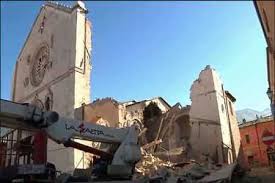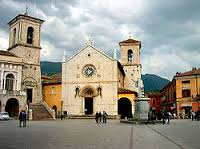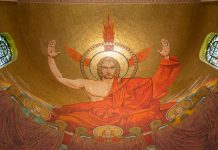There was another earthquake in Italy the other day (October 30th), in the town of Norcia, the birthplace of Saint Benedict, where 
there are a group of Benedictines, men and women’s Orders, that adhere to the way things were done in the days of their founder in the 6th century. Well, not exactly, since they do use cell phones and brew what I hear is a delicious beer with some modern techniques, but they are traditional and faithful and, like Saint Benedict, a light to the world. I was glad to read that no lives were lost in the earthquake, which was larger (6.6 magnitude) than the one that killed 289 people on August 24th in and around Accumoli (6.2 magnitude) about 30 km south.
Many buildings, however, were levelled in this quake, including the cathedral of Santa Maria. Some nuns, who were praying therein, escaped without harm in what may well be a miracle. Like the two toddlers who survived the suicide-murder jump of their father, I suppose the heavenly Father looks after His own sons and daughters. There is nothing random in God’s providence, whose care of the universe is both ‘concrete and immediate’ (CCC, #303), including every block of concrete and stone in the buildings made by Man. Is God telling us something here? Perhaps, as Saint Paul writes, the form of this world is passing away, and, from the lesser lights of the Scottish bard, even the best laid plans (and buildings) of mice and men gang aft awry…
A curious interplay of said providence: Voltaire, the French anti-Catholic satirist (his aphorism was l’ecrasez infame, destroy the infamous thing) who went to meet the God whose existence He denied in 1778, a decade before the French Revolution whose philosophical underpinnings he helped to create, used the great Lisbon earthquake of 1775 to disprove God: That mighty tremor (nearly 9 on the Richter scale), which struck on this day, All Saints, took perhaps 100,000 lives in Lisbon alone, including many who were praying in the churches, making it one of the deadliest earthquakes in history. Why, cried Voltaire, would God destroy so many of His own faithful? Could He not have spared them?
Well, yes, but perhaps He wanted them in heaven, to add to the panoply of saints on this blessed solemnity. This may sound harsh to those like Voltaire, whose vision is limited to this world alone (at least, so the apocrypha goes, until his deathbed), but death, as Pope John Paul II declares in Evangelium Vitae, is but a penultimate evil. The ultimate evil, of course, is to die unrepentant of one’s sins and face an eternity separate from God, which fate we may hope even the witty rapscallion Voltaire, who used his intellectual and literary gifts so apparently for a bad end, avoided by a last breath of contrition and remorse. The faithful in all those Lisbon churches, like the monks in Norcia, were likely all ready to meet their Maker, and, even for those not so ready, we know not the limits of the mercy of God, Who, as the saying goes, writes straight even with the crooked lines of a pen like Voltaire’s, and Whose care is evident even in the tossing to and fro of the very foundations of the firmament itself.
I read somewhere that if you were to enlarge an egg up to the size of the Earth, its shell would be many times thicker than the relatively paper-thin crust upon which we live and construct all of our edifices. Under that, is the ‘yolk’ of thousands of miles of semi-molten rock, much of it under intense pressure and in constant fluid motion. We are quite literally walking on eggshells all the time, hanging by the all-powerful, yet rather unpredictable, thread of God’s protective care, which He sometimes allows to go ‘slack’, to remind us that our hope is not in this world, but the next, and that we must all, like the good Benedictines, be ready, for we know neither the day nor the hour.
All the Saints of God, orate pro nobis!











